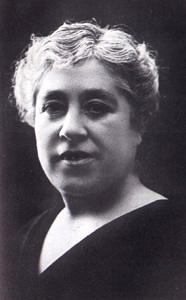English
Caterina Albert, L'Escala (Alt Empordà), 1869-1966 was a novelist, storyteller, playwright, poet, and pioneer in the Catalan literary tradition of works by women although, like other European women writers of the time, she was forced to conceal her identity by using a male pseudonym. The name she chose was Víctor Català.
She originally hoped to write for the theatre but, after the scandal that followed the publication of her monologue La infanticida (The Infanticide), which received a prize in the 1898 Jocs Florals literary competition in Olot, she opted to write short works and, to a lesser extent, novels. These works brought immediate recognition and decisively marked the evolution of twentieth-century Catalan fiction, most notably with her influence on women writers who, from Mercè Rodoreda through to the present day, do not hesitate to embrace her as their mentor.
Writing in the period of Modernism, she became known with the work Drames rurals (Rural Dramas, 1902), which gave rise to a genre with the same name. This was followed by Ombrívoles (Shadows, 1904), Caires vius (Sharp Edges, 1907) and the novel Solitud (Solitude, 1905), which is considered to be her masterpiece. In these three works, she inquires into the situation of women in the society of the time, relations in couples, and work, especially in rural settings, offering a very negative image, full of cruelty and violence, which contradicted the idyllic pastoral models inherited from the nineteenth century. Mila, the main character in Solitud, rebels and in a wholly symbolic gesture leaves her home and her husband to start a new life.
After a period of silence, which coincided with Noucentisme –an early twentieth-century Catalan politico-cultural movement in the service of bourgeois reformism– Caterina Albert began to write again, testing new formats and techniques inspired by cinema with her novel Un film (3.000 metres) (1926) and new collections of short stories: La mare ballena (Mother Whale, 1920) and, subsequently, Contrallums (Against the Light, 1930), which include some of her best stories. In the years immediately after the Civil War, her acute observations now appeared in stories adapted to the new society of the years following the 1930s, and published in the collections Vida mòlta (Life Worn Out, 1950) and Jubileu (Jubilee, 1951). She also published Mosaic (III) (1946), a volume of articles she had written since 1903 describing some autobiographical aspects of her life. This work is important since it bears witness to the difficulties she had to face as a woman writer.
Up-dated by Lluïsa Julià and Nausica Solà for AELC.
Documentation: Xavier Gual.
Photographs: Arxiu-Museu Clos del Pastor, L'Escala.
Translated by Julie Wark.

